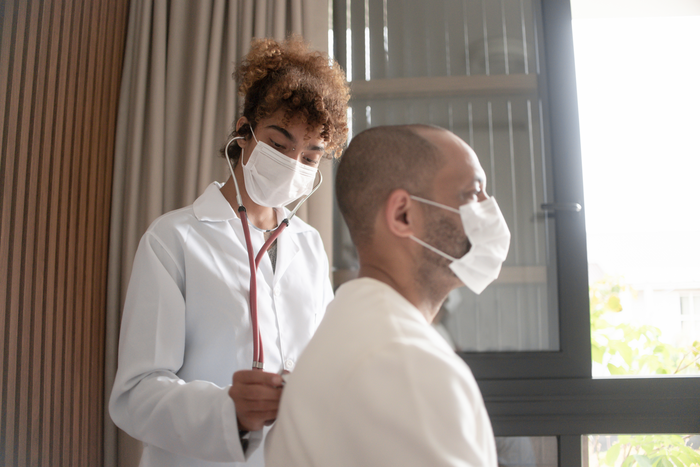Dec. 2, 2022─ In a new study published online in the American Thoracic Society’s American Journal of Respiratory and Critical Care Medicine, researchers sought to determine the percentage of COVID-19 patients discharged from the hospital who had a type of fibrotic lung damage, known as interstitial lung disease, that requires ongoing follow-up care. These patients had varying degrees of COVID-19 severity at hospital admission.

Credit: ATS
Dec. 2, 2022─ In a new study published online in the American Thoracic Society’s American Journal of Respiratory and Critical Care Medicine, researchers sought to determine the percentage of COVID-19 patients discharged from the hospital who had a type of fibrotic lung damage, known as interstitial lung disease, that requires ongoing follow-up care. These patients had varying degrees of COVID-19 severity at hospital admission.
In “Residual Lung Abnormalities Following COVID-19 Hospitalization: Interim Analysis of the UKILD Long-COVID Study,” the authors examined evidence of abnormal lung patterns on follow-up CT scans from COVID-19 patients discharged from the hospital—patterns which could be suggestive of interstitial lung disease. The characteristics of the 209 study participants who had CT scans were applied to a wider post-hospitalization cohort of almost 3,500 people without a CT to stratify risk of residual lung abnormalities.
“Interstitial lung disease” refers to a broad group of diseases that are characterized by lung scarring, including idiopathic lung fibrosis. This scarring makes it difficult to breathe and get oxygen into the bloodstream. Lung damage from this group of diseases may be irreversible and get worse over time.
“We estimated that up to 11 percent of hospitalized COVID patients had fibrotic patterning after recovery from the acute illness,” said corresponding author Iain Stewart, PhD, advanced research fellow (Rayne Foundation), Margaret Turner Warwick Centre for Fibrosing Lung Disease, National Heart and Lung Institute, Imperial College London. “Whilst many people experience prolonged breathlessness, the major implication of these findings is that a substantial number of people discharged from a COVID hospitalization may also have fibrotic abnormalities in their lungs. These results should help concentrate efforts to closely follow at-risk patients. This follow-up should include repeat radiological imaging and lung function testing.”
He added, “For some people these fibrotic patterns may be stable or resolve, while for others they may lead to longer term lung fibrosis progression, worse quality of life and decreased life expectancy. Earlier detection of progression is essential to improving outcomes.”
The UK Interstitial Lung Disease (UKILD) study was performed in cooperation with the PHOSP (post hospitalization)-COVID study, which consists of researchers and clinicians from across the United Kingdom, to look at how different patients who were hospitalized with COVID-19 subsequently recovered. The UKILD COVID study excluded patients in PHOSP-COVID who had interstitial lung disease prior to COVID-related hospital admission.
Interim study participants were discharged from the hospital by the end of March 2021, while interim data were collected until October 2021, restricting the analysis to 240 days after discharge. The researchers identified patients with thoracic CTs from the PHOSP-COVID database. The primary outcome they sought to determine was the prevalence of residual lung abnormalities in people discharged from a COVID-19 hospitalization. Analyses were performed to determine participants’ risk factors of residual lung abnormalities in those who did not receive a CT scan. These risks were used to estimate prevalence in the overall population hospitalized by the end of March 2021.
According to the authors, “The UKILD Post-COVID interim analysis of residual lung abnormalities in patients hospitalized for COVID-19 offers the largest assessment of prevalence in hospitalized individuals to date, and is consistent with findings from a number of smaller studies that demonstrate persistent radiological patterns and impaired gas transfer during the extended follow up of patients with COVID-19. At the time of this interim analysis it is not possible to determine whether the observed residual lung abnormalities represent early interstitial lung disease with potential for progression, or whether they reflect pneumonitis that may be stable or resolve over time.”
“The next phase of the study is a primary analysis, which will be performed at 12 months. At that time, we will also use linked electronic health records of hospital admissions and mortality data to support our analyses. We expect to have the final results in early 2023.”
Journal
American Journal of Respiratory and Critical Care Medicine
Method of Research
Data/statistical analysis
Subject of Research
People
Article Title
Residual Lung Abnormalities Following COVID-19 Hospitalization: Interim Analysis of the UKILD Long-COVID Study,
Article Publication Date
2-Dec-2022




